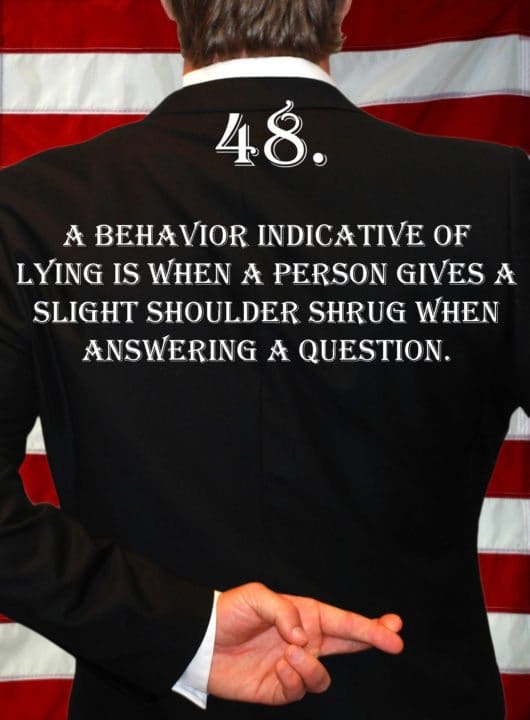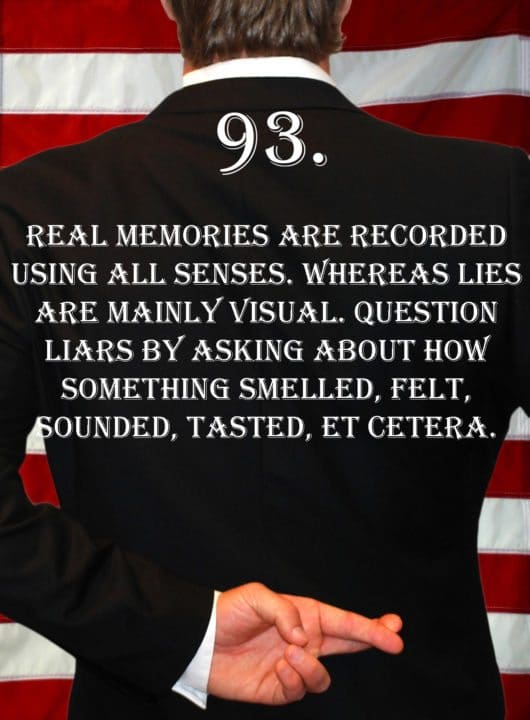
Deception Tip 65:
Liars prefer to conceal the truth rather than coming up with an entirely new story.
Listen To The Podcast!
E65 – Conceal The Truth – Deception Tips Podcast – Click Here To Subscribe
Podcast Transcript
Hello and welcome to the Deception Tips podcast where you will learn amazing cues to detect deceit that will help you read people like never before. I’m your host Spencer Coffman, let’s get started.
Welcome to deception tip episode number 65. I really hope that you are enjoying these podcasts, I hope that you are taking advantage of all of the other material that I have available to you for free, the deception tips blog, the videos, and the deception tips website. I really need something in return from you, if you don’t mind, could you quickly leave a review on wherever you’re listening.
If it’s iTunes or iHeart radio or wherever it may be, leave a review quickly, you don’t even need to put any comment. You can if you want but if you could just give a rating of this podcast that would really help to let me know what is going on in your guys’ minds. Comments would always be appreciated and also, if you would comment on the YouTube channel, that would be cool as well.
Last week, we spoke about a deception tip that was related to a tip from before and it was about rephrasing the question, the one from before was on repeating the question.
When people lie and are asked a question to answer, they’re given some form of narrative opportunity response. When someone says it’s not a yes or no question because a yes or no question as we’ve talked about, that should never be any question at all.
It’s a question but it shouldn’t be a question in the person being asked, it’s mine, it’s kind of confusing there, but yes or no questions are so simple and straightforward that there should never be any confusion around them, that’s what I should say, confusion.
When someone asks a yes or no question, the answer is, ‘yes’ or ‘no’ and the question is very clear. There’s nothing about it, it’s yes or no, it’s a very direct thing, and there’s no confusion about that question.
However, a narrative question or narrative response is an open-ended question that allows the person being asked to give a narrative response to it. That could have some confusion if the question is not asked properly.
However, even if it is asked properly, liars may use this stalling tactic of either repeating the question themselves, rephrasing it themselves or asking the target to repeat the question or rephrase the question.
This is done to give them a little bit more time to prepare and to plan on how they are going to deliver that lie. It’s also similar to roll starting the car if they repeat or rephrase the question themselves, it gets them talking, it gets things going then they can just continue on with their story, it’s an icebreaker for the liar. In addition, you need to be careful of it because if you start repeating and rephrasing questions for them and then they start asking you stuff.
You start answering, you’re starting to develop a little bit of a rapport with them which could then influence your opinion or the facts that you collect because it’s the facts you think that you’re collecting.
So, pay attention to that, watch out for it and just know that if someone starts repeating or rephrasing questions you need to pay a little bit of tension to the other signs that may be going on around there.
Today, we are talking about a new tip, this tip is something that is related to the general overview of lying and what liars would prefer to do rather than what they do or what they don’t prefer.
So, liars have a lot going on, we’ve talked about it a few times before, all of the different things. They are preparing this lie, they’re also worried about being caught, so they’re under a lot of stress and tension.
They’re worried about how they’re going to deliver the lie, then they’re worried about the consequence of whatever they did. They’re also worried about the consequence of lying because that’s something that goes against what they want to do and then they’re worried about getting caught. If they get caught, there is the consequence of what they did and what they’re lying about they did.
So, there is a double consequence there and it’s just all of this stuff that’s going on that they’re worried about, that they’re stressed on. So, in general then liars, they’re just so busy in their minds, they’re so occupied with all of this stuff, they don’t have the mind power to invent an entirely new story.
Therefore, they would prefer to take the real story, which is the truth, and just twist it a little bit or convert it or hide certain elements or leave things out and they’re going to use the truth to base their lie.
So, here it is, deception tip number 65. Liars prefer to conceal the truth rather than coming up with an entirely new story. Here it is again, deception tip number 65. Liars prefer to conceal the truth rather than coming up with an entirely new story.
This is important because it tells you that liars have so much going on in their mind. They’re so stressed, they’re so tense, they’re so worried about the consequences of what they did and covering up what they did.
The consequence of lying, the consequences of getting caught in the lie, and then the further consequence of those combined problems, so they’re so stressed out about that. They can hardly remember what’s going on, therefore, they want to use something that they are already familiar with.
Well, they already know the truth, they know what they did, or they know what happened, but they don’t want to tell you that because of some kind of a consequence that could happen because of it.
Whether it’s something against them or they’re protecting someone else, so they’ll work with that story. That’ll be their baseline because it’ll be easier for them to remember because there’s already so much going on in their mind. So, they will use that, they will leave out a few details, they will add a few details and they will invent their lie based on truth.
Did you ever see that movie based on a true story? Well, guess what? The story is I went from here to the mailbox and then home again. Anything can happen in between, the story is I went from here to the mailbox, the movie could be I got attacked by wolves, I got kidnapped, I ended up here, who knows. That could all be fiction in the middle of the story, I went from here to the mailbox and was based on a true story.
So, liars like to base things on a true story, which means their story may not be true but it was based on truth because they prefer to conceal elements or remove elements that entirely falsify them, simply because they don’t have that memory power to get through the whole thing and to invent a new story.
Think about all that that it would require, they’d have to memorize that and then if anyone asks, they’d have to tell everybody the same story. So, it could be a big test of memory and we’re going to talk a little bit more about everything that would go into doing that, coming up right after this.
Are you loving this podcast? Spencer Coffman has created some deception tip videos to help you keep the wool off of your eyes. Subscribe to the body language channel on YouTube today.
Welcome back to deception tip number 65 where we are talking about how liars want to conceal the truth rather than completely falsify or come up with a new story. Why do they want to do this?
It is much easier to conceal than to falsify, remember that. Liars don’t have the memory capacity or the brainpower at that point in time to invent and come up with and remember an entirely fictitious story, they just don’t have it.
The reason is there’s so much else going on that the brainpower has not been allotted to that area of the brain, the creativity area or the inventing a new story, the memory, and everything, it just won’t happen.
People know that if you’ve lived that experience it’s much easier to recall it, it’s much easier to talk about it, and it’s much easier to tell it. This is why when you’re telling your own stories the moment when something happens, you’re always reminded of them and then you could talk about them.
But when you’re trying to remember something that someone else did, it may be a little bit more difficult because you didn’t experience it fully, you didn’t live it, you didn’t go through it with all of your senses. Therefore, liars will base their story on truth because then they lived it and they’ll just have to remember the few parts of information that they want to add and the few parts that they want to take away.
Again, why are they doing this? What is going on when this is happening? Well, if they invent a new, entirely fictitious story, then what’s happening is they’ve created something that they haven’t lived, so now they have to remember it, it’s like a rehearsed, it’s memorizing lines, they’re memorizing a story.
When they deliver this story, there’s a lot more that could go wrong because now they’re delivering it from memory and memory is not foolproof, memory is not that great.
Have you ever memorized something, whether it’s a Bible verse or a story from a play or something like that? If you memorize this and then come back to it, later on, you may find that you don’t remember it as well, you’ve forgotten some things, you’ve left some stuff out.
Therefore, liars, when they memorize this story, they need to make sure that when they tell it, it’s being told the same way or being told so it doesn’t appear rehearsed, that’s the other thing.
So, when you’re watching this, if a liar invents an entirely fictitious story, you better be able to catch him right away because it’s going to appear rehearsed like they memorized lines, they’re delivering it right away. If you suspect that they may be doing that, throw a wrench in there by stepping out or by spilling something or doing something unexpected so that they break their train of thought, boom, right off the rails.
When they come back to it, where was I? They may not remember, they’re going to be all twisted up because you interrupted their rehearsal, you interrupted their delivery of those lines, that’s a great way to put a hole in that.
In addition, if they tell you that story, now they need to be telling someone else because most of the time people aren’t questioned by just one person. They’re going to be interrogated by a couple of people and the story is going to be compared, etc.
So, they’ve got to tell that same story to another person in the same way so that it doesn’t appear like they’re lying. This could create two kinds of problems. Number one, they rehearsed it, so now they’re going to deliver it in exactly the same way.
Well, when you have the playback, he’ll say, hey, they said the same thing word for word to me. Okay, well then, we know it’s rehearsed because it’s the same thing.
The pauses were the same, the delivery was the same, the breathing was the same, clearly, that was rehearsed, boom, red flag, they’re caught. The other thing that could happen is if they’re rehearsing it, they could forget some stuff the second time they deliver it, or they could add some new stuff the second time they deliver it. So, this could create a problem because now they’re leaving stuff out, they’re adding new stuff.
You compare the two or you talk about them and be, whoa, this person doesn’t even know what they’re talking about. The first time they said it, it was like this, the second time they said it, it was like this, neither of the two really match up, something is not jiving here, we’ve got to talk to him again.
You go in there with the both of you and you talk to him again and now it’s different the third time because they can’t keep it all straight, so now you know they’re lying because it’s all messed up.
This is why when people lie, they tend to base it on truth because they can remember that narrative and they can substitute stuff in. So, for people who are trying to spot lies, this makes it a little bit more difficult because now we know that there are some true elements in the story.
Therefore, when you see bodily leakage and deceptive behaviors you know the person is being deceptive but it’s very difficult to tell what they’re lying about.
You can’t read their mind, you don’t know. The reason you don’t know is that there are probably true elements in that story, so what are they lying about? Well, it’s about something. This is why it is so important for you to get them to repeat stuff and ask them the same questions but in different ways so that they repeat themselves. Then you can narrow down where the body language leakage is happening because you’ll be able to pinpoint it.
You say, wait a minute, go back and tell me again about when this happened and then they can give you that story and you say, okay, that looks pretty good, there was nothing there, keep going. Then you can keep going back and forth and you may notice that every time they talk about a specific instance they do some form of behavioral leakage and it looks like a deceptive behavior, but you’re not quite sure but hey, it’s happened the past three times they wrapped this up.
They must be lying about something right in there, but you don’t know what it is. Maybe they weren’t there, maybe they were, maybe they were there longer than they say they were.
Whatever the case is, you can narrow it down because you know that in that story there are probably some elements of truth. So, that’s why it is very important to look for patterns and clusters of behavior because then you can see the entire thing play out.
In addition, it’s always important to have them repeat things or for you to go back and repeat things to make sure you understand them correctly. Then get them to confirm that and see if you see repeat body language behaviors that are signs of deception because that’s what you’re looking for, you need confirmation to the 10th power.
You want them to exhibit these signs over and over again so that you can be certain that something is going on. You need to know because otherwise, if you just think you know, then that could be a problem later on. So, watch out for patterns and clusters of behavior and look for repeat behaviors in the same areas of the story because liars will use the truth and just twist it to tell their lie.
I want to thank you for listening to this week’s episode of the deception tips podcast. I hope that you’ll share it with your friends, subscribe to the feed, check out the deception tip videos, the blog, and take a look at the books I have available and as always, tune in next week for a new deception tip.
Video Transcript
Hey guys, my name is Spencer Coffman, thank you for watching the deception tips videos, they’re all about teaching you how to read people and detect deception so that you will be able to tell if someone is lying to you. Today, we are going to talk about a simple fact about liars and that they don’t necessarily always want to reinvent the whole story.
A lie is not always entirely false, this is a myth that people seem to believe that when someone lies, it’s a fabricated story or it’s a fictitious event, that the entire thing is completely fake, this is a huge myth. Usually, when people lie, there are a lot of bits of the truth mixed in with that lie for several reasons.
Number one, it’s easier to remember, it’s easier to tell, they don’t have to keep track of so much, among other things. That’s what we’re talking about today, liars don’t always want to completely fabricate the entire story. Oftentimes, they would prefer to conceal the truth rather than invent something new.
So, here it is, this is deception tip number 65. Liars prefer to conceal the truth rather than coming up with an entirely new story. So, they want to conceal this truth. If there’s something that happened, they are more interested in covering it up and leading people in the wrong direction rather than pretending that okay, it didn’t happen, let’s say something else happened and go with it from there.
Our brains and code memory in a sporadic and messy way, it’s not neat and orderly like a file cabinet. Everything is just thrown in there and then we can remember it or recall it as it starts to be stimulated or probed through other events that happen. Therefore, if they did that, if they say, “Okay, we’re going to pretend this didn’t happen and instead we’re going to invent this new thing and say it happened”, the memory would still serve up this old information.
Therefore, if there was some kind of a spontaneous trigger that happened and they started talking about it, it would be very difficult for them to remember, consciously remember to tell this lie over what really happened. Liars would prefer to merge those two together, so something really happened, we’re going to change this, this, and this.
“Okay, now this is how it went down”, that way when the real event gets triggered or when something in their memory triggers that event and they start talking about it they know that “Okay, they’re talking about it, wait a minute, this event is a little bit different because I changed it”.
They don’t need to remember the entire lie, all they need to do is remember the event naturally, spontaneously because it’s in the memory and then only a few points that are changed or a few details that are different and then other people will extrapolate from that or assume things.
One of the greatest lies is allowing people to tell other lies for you. When people are really good at lying or if they are criminals or in interrogation situations, so those of you in law enforcement this is important. A lot of people that you’re going to be dealing with, they would prefer to allow you to draw all the conclusions and come up with your own story. Of course, you’re not going to see it that way but that’s what they are doing.
For example, you may say, “So, you did this and then what?” Okay, well, maybe they didn’t even do that, you just projected that on them and now that’s what they did. So, they could allow you to continue on that story and you’d have the whole thing wrong. Then, later on, you say, “Well, that’s what you told me” and they say, “No, that’s what you said, I did”.
So, they’re going to allow you to tell that life for them so they don’t even have to tell it and that’s something to be very careful of, never ever push things on other people, let them speak and tell you what the story is before you assume anything. You don’t need to be insinuating things and this is a huge debate when it comes to getting witness statements from children because a lot of interrogators push that on children.
Whereas they would say things like they put words in their mouth, they would say, “Oh, well you saw it got smashed, right?” Then, later on, the child, who may have never heard that word before is now describing this thing with the word smashed rather than just hit. It sounds a lot more dramatic than it really was due to the interrogator putting those words in someone’s mouth. So, if you’re asking questions, be careful of that and if you’re on the receiving end of the questions be careful with that as well.
The main thing to remember here is that these stories people prefer to conceal the truth and let other people extrapolate on it and assume. So, do not fall into that trap, do not let yourself extrapolate on someone else’s truth and turn it into a lie. Allow them to say it because if they have to tell you that lie then there are a lot more chances for them to slip up and it’s a lot better for you to spot the truth.
So, if this is your first time watching these videos, I’d love to have you subscribe to the channel on YouTube, feel free to comment with any questions you may have as well. Also, if you’d like some more information, we’ve got books, podcasts, blog posts, all available on spencercoffman.com that are dedicated to teaching you exactly what every body is really saying.
Until next time.






